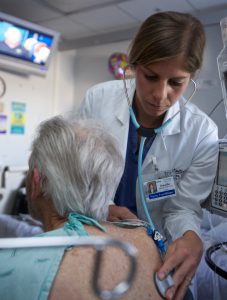DNP—Adult Gerontology Acute Care Nurse Practitioner
 Our Adult-Gerontology Acute Care Nurse Practitioner (AGNP-AC) track within the Doctor of Nursing Practice (DNP) degree program prepares you to focus on caring for young adult, adult and older adult patients. You will care for patients with complex acute, critical and chronic illness, disability, and/or injury related to health across the lifespan.
Our Adult-Gerontology Acute Care Nurse Practitioner (AGNP-AC) track within the Doctor of Nursing Practice (DNP) degree program prepares you to focus on caring for young adult, adult and older adult patients. You will care for patients with complex acute, critical and chronic illness, disability, and/or injury related to health across the lifespan.
As an Adult-Gerontology Acute Care Nurse Practitioner, you will specialize in caring for patients who have high-intensity nursing and medical needs. Your partnership with patients and families will teach them self-management, including how to treat and prevent disease.
Adult-Gerontology Acute Care Nurse Practitioners are prepared to:
- Perform comprehensive health assessments, including ordering, performing and interpreting diagnostic tests and procedures
- Perform the following procedures:
- point-of-care ultrasound
- endotracheal intubation
- central venous catheter
- arterial line
- thoracentesis
- paracentesis
- chest tube insertion
- Create differential diagnoses and diagnose acute and complex illnesses and complications
- Partner with patients and families for health promotion and disease prevention and treatment
- Prescribe and evaluate therapies (medication and non-medication-based)
- Utilize developmental, patient-and family-centered approaches
- Advocate for nursing and the role of the AGACNP
Sites of practice
Graduates from our AGACNP track practice independently and within larger healthcare teams. They work in a variety of settings and with diverse populations, including:
- Hospitalist
- Critical Care
- Inpatient and Outpatient Specialist Services (e.g., gastroenterologist, infectious disease, neurology, endocrinology, nephrology, hepatology)
- Cardiology (advanced heart failure, structural heart disease, electrophysiology, general)
- Surgical specialties (e.g., cardiothoracic surgery, orthopedics, trauma, otolaryngology)
Curriculum
All Doctor of Nursing Practice tracks are offered as full-time study only.
Year one
Year one of the DNP program is offered in a hybrid format (50 percent in-person, 50 percent distance learning), and requires that you be on campus one day per week. You will complete core DNP academic classwork with peers across all DNP tracks in the School of Nursing. Content of year one courses includes:
- leadership
- appraisal and application of evidence to advance practice
- health equity
- health systems and policy
- wellness and health promotion, and
- quality improvement
Year two
In year 2, students establish the foundation of advanced practice education of the lifespan, which includes:
- pathophysiology
- advanced physical assessment, and
- pharmacology
Students build upon this in track-specific advanced assessment, diagnosis/management, and pharmacology. You will gain advanced practice skills from these academic and lab courses to move into clinical placements during spring quarter.
Year three
As in year two, many courses require in-person attendance with some courses including distance learning methods. In the final year of your program, you will continue clinical training.
In addition, you will work with your supervisory committee to complete a DNP final project in collaboration with a local clinical agency or organization. This project is presented in the form of a final examination.
Role of the DNP
Our DNP program prepares you not only for an advanced practice role but also teaches you how to look at leading-edge research and apply that evidence to your practice.
The DNP program’s additional academic and clinical hours beyond a masters-level degree gives you a solid foundation to become a leader in the nursing profession. You will work with faculty who are nationally recognized for their research and also with agencies around the Puget Sound region to gain hundreds of hours of hands-on clinical experience.
By combining advanced practice nursing skills and knowledge of how to evaluate evidence-based research, you are empowered to become a more efficient and effective practitioner.
Post-DNP study
Graduates from the AGNP-AC track who are interested in focused, intensive specialty training may wish to consider applying for post-graduate fellowships in that area (for example, trauma, oncology, or cardiology) following completion of the DNP program.
National certifications
After successfully completing the AGNP-AC track, students are eligible to sit for the AGNP Acute Care examination through the American Nurses Credentialing Center (ANCC) or American Association of Critical Care Nurses Certification Corporation (AACNCC).
Accreditation
The Doctor of Nursing Practice program at the University of Washington is accredited by the Commission on Collegiate Nursing Education (http://www.ccneaccreditation.org).